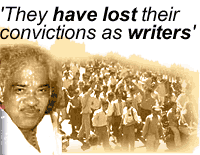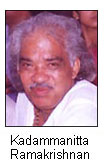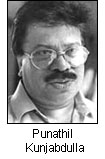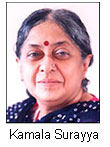The Rediff Special/ George Iype


Most Indians tend to shrink from even terms like 'elections,' let alone the thought of actually contesting in one. In politically alive Kerala though -- where assembly elections are in the offing -- four famous authors have actually discovered the virtues of politics as opposed to creative angst.
But why are poet and novelist Kamala Surayya, novelist Punathil Kunjabdulla, scriptwriter Madambu Kunjukuttan and poet Kadammanitta Ramakrishnan suddenly exhibiting an attraction towards politics? Some say it is to do with their intellectual leanings towards Marxism. Others attribute it to an ideological affinity towards the Bharatiya Janata Party. A third opinion says these authors are finally exposing their fake credentials.
Whatever the true reason, these authors are livening up Kerala's polls. Take Kamala Surraya, who gave up Hinduism, her famous Malayalam name Madhavikutty and English pen-name Kamala Das to convert to Islam. "I am in politics to cleanse it. I feel the people deserve a better deal than the current set of politicians in India." At the moment, she has limited her role to educating people about politics.
 Acclaimed Malayalam poet Kadammanitta Ramakrishnan, who is contesting the polls on a Communist Party of India-Marxist ticket from the Konni constituency, does not agree with her. "I do not think poets like me alone can cleanse politics of its impurities. This does not mean that, because I am a poet, I am a lesser public personality. Why can't writers also be people's representatives?"
Acclaimed Malayalam poet Kadammanitta Ramakrishnan, who is contesting the polls on a Communist Party of India-Marxist ticket from the Konni constituency, does not agree with her. "I do not think poets like me alone can cleanse politics of its impurities. This does not mean that, because I am a poet, I am a lesser public personality. Why can't writers also be people's representatives?"
Doctor-turned-novelist Punathil Kunjabdulla says he has discovered "truth" in politics and therefore decided to contest on a BJP ticket. "They were the first to offer me a ticket. If the Congress or the CPI-M had offered me a ticket first, I would have accepted it. It is my commitment to the people, and not any kind of affinity towards any particular party, that inspires me."
 Kunjabadulla, who has penned the bestseller Smarakashilakal, says this is his second brush with politics. "The first time," he smiles broadly, "I stoned buses in my native village, Madappally, during the 1957 liberation struggle against the communist government led by E M S Namboodiripad."
Kunjabadulla, who has penned the bestseller Smarakashilakal, says this is his second brush with politics. "The first time," he smiles broadly, "I stoned buses in my native village, Madappally, during the 1957 liberation struggle against the communist government led by E M S Namboodiripad."
As Kunjabdulla knocks door after door in Beypore -- the constituency he hopes to represent -- his writer colleague, Madambu Kunjukuttan, takes time off to express some of his own views. "I am contesting on a BJP ticket because I am disappointed with communism."
Kunjukuttan -- celebrated author of the novel Bhrasht, acclaimed scriptwriter and Sanskrit scholar -- sees no reason why his saffron leaning should influence his writing. "My writing has nothing to do with politics," he avers strongly.
A former president of Yuvakalsahithi, the cultural wing of the Communist Party of India, he is contesting as the BJP candidate from Kodungalloor, a CPI stronghold. "I have felt a philosophical angst all these years because communism depresses me. The movement itself has become outdated and irrelevant. Communists will never prosper in India because they have not been able to Indianise their philosophy and practice."
Yet, it is difficult to understand this former communist's present fascination with the BJP. "The BJP have been able to grow at such a fast pace," he explains admiringly. "They have been able to stimulate something that is present in the blood of every Indian."
Kamala Surayya, who has converted her flat in Cochin into the Lok Seva Party's headquarters, says politics offers her a wide spectrum in public life. "Every day, dozens of young girls and boys come here to meet me. They are thrilled by the new public standard that my political party is setting in the highly-politicised Kerala landscape."
 Surayya, who speaks from behind a black purdah, says she initially floated the LSP with the intention of fielding young candidates during this election. Later, however, she was forced to change her mind. "Contesting an election means lots of money. My party does not have the resources. Therefore, we are limiting our campaign to educating people about good and bad politics." Her young supporters wait outside to accompany her to street corner meetings organised by the LKP.
Surayya, who speaks from behind a black purdah, says she initially floated the LSP with the intention of fielding young candidates during this election. Later, however, she was forced to change her mind. "Contesting an election means lots of money. My party does not have the resources. Therefore, we are limiting our campaign to educating people about good and bad politics." Her young supporters wait outside to accompany her to street corner meetings organised by the LKP.
Politics is not new to Surayya, the pen behind celebrated works like My Story and The Sirens. She had contested the 1984 Lok Sabha elections from Trivandrum as an Independent. It was an election she lost hopelessly; her deposit was forfeited.
Surayya's decision to convert to Islam in 1999 had invited criticism from Hindu fundamentalists. Now, her decision to float a political party has the Muslim leaders upset. "She said she joined Islam to expose Hinduism. Now she says she is into politics because she is upset with Islam. There is something wrong with Kamala Surayya," says Muslim thinker Mohammad Ali Mustafa. "I think writers like Surayya and Kunjabdulla are entering politics for their own publicity and not for any social and public service. They have lost their convictions as writers."
Is this accusation true?
"No," says Kunjabdulla, whose novels and stories are known for exposing the vanities, deceptions and phoney mannerisms of social life. "Through politics, I am experiencing life in a larger, more meaningful context in politics. Winning or losing is not my concern."
Ramakrishnan, who contested and won the elections for the first time in 1996 on a CPI-M ticket, offers what he claims to be a better picture. "Writers have a responsibility to the society. Politics is the best way to discharge that responsibility." He explains how, in his noted poems like Kuathi, he depicted the awakening of the suppressed slave class who then begin to question the establishment. "Now, with politics, I have the power to ask such questions."
"Love and truth are my catchwords in politics. I am not bothered about what others say about my political party," says Surayya, as she has the defiant last word.
Design: Lynette Menezes
You might also like to read...
'Allah told me that in order to be effective, you should have political power'
Kamala Das, veiled
Prophet-sharing
Surayya caught in the eye of a storm
When the temptress dons the purdah...
Kamala Das, nee Surayya, is VHP's new hate object
'I have not glorified lust'
Miscellania: Kamala's Das' columns
Muse's Musings: Kamala Das' columns
The Rediff Specials